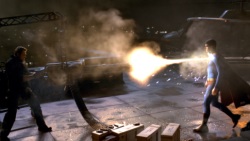Superman Returns
“They can be a great people, Kal-El. They wish to be. They only lack the light to show the way. For this reason above all – their capacity for good – I have sent them you: my only son.”
– Jor-El
 Superman will soon be leaving us, and not a moment too soon. After racking up an impressive opening week with his latest adventure, Superman Returns, he got his ass kicked by some dead men’s chests or somesuch.
Superman will soon be leaving us, and not a moment too soon. After racking up an impressive opening week with his latest adventure, Superman Returns, he got his ass kicked by some dead men’s chests or somesuch.
So let the man go away for a while. Five years at least, maybe forever. We don’t want him around. Lois Lane got it right in her Pulitzer Prize-winning editorial the last time that loser left Earth: The world doesn’t need Superman, or at least this one.
It’s time to let him retire, as long as our understanding of his soul is so underdeveloped. Until some filmmaker again treats him as a character instead of an icon, he will remain quaint, dull, and more than a little baffling. In Superman Returns, he’s an anachronism, neither contemporary nor relevant.
Bryan Singer’s movie has a few inspired, lovely moments. The sight of Superman being still, listening from space to the horrors below him, offers insight into the mechanics of the superhero that we rarely see: This is how he recharges, and how he decides whom to help.
And this is where the realization hits that Singer’s movie is ill-formed and under-thought.
Superman Returns could have paused here, emphasizing the process and the choice, but instead it rushes relentlessly forward. (The movie lacks drama, excitement, and even a coherent style, but it does zip around briskly, with all the purpose of an annoying insect.) Superman flies into Metropolis, to save a driver whose brakes have failed and the pedestrians she’s endangering. This entry on his karmic ledger? Perhaps the lives of a dozen people.
But is that the best he could do? Of all the tragedies happening in the world – famine, war, terrorism – he chose to stop a runaway car?
What Superman is missing in a contemporary conception is self-awareness and self-doubt. Superman might be immensely powerful, but as a young man (in Superman: The Movie) he recognized his limits:
“All those things I can do. All those powers. And I couldn’t even save him.”
He has ample reason to question himself. Charged by his father with being a role model, Superman is a dismal failure. His shortcoming lies not in his actions but in his methodology: He lacks imagination. Blessed with superhuman strength, a virtually impenetrable shell, the ability to fly, and unmatched vision and hearing, Superman chooses mundane, showy, and unreproducible heroics. Using Superman is a guide for human behavior is akin to telling grade-school kids that they ought to be able to play basketball like Michael Jordan in his heyday.
Consider the lives Superman could save if he dedicated himself to eradicating malnutrition. Hunger, after all, is a problem stemming primarily from a lack of effective distribution, not a lack of food. He could fly hundreds of tons of food to places that need it. With that icy-fresh breath of his, he could reverse global warming. Who better to find and ass-whup Osama bin Laden? What could Superman do if his understanding of “justice” extended beyond bank robbers and cackling villains?
 Superman’s father wanted him to be a model not of strength but of goodness. Jor-El understood that one person – even one with the abilities of Superman – cannot save the world. But he can serve as an example. And while human beings cannot take a bullet to the eye without some serious damage, they can do good.
Superman’s father wanted him to be a model not of strength but of goodness. Jor-El understood that one person – even one with the abilities of Superman – cannot save the world. But he can serve as an example. And while human beings cannot take a bullet to the eye without some serious damage, they can do good.
It’s instructive to consider Superman as a Christ substitute primarily for their dissimilarities. Jesus’ miracles were rare precisely because they provided no guidance to human beings; they served primarily as proof of his divinity. More than anything, Jesus taught:
“If anyone strikes you on the right cheek, turn to him the other also.”
“Love your enemies.”
Superman does not teach, and offers only miracles as his example.
This is a clear violation of his father’s stern command in Superman: The Movie (whose score and Jor-El bits Singer samples):
“It is forbidden for you to interfere with human history. Rather let your leadership stir others to. Live as one of them, Kal-El, to discover where your strength and power are needed.”
A broad reading of this maddeningly vague (and self-contradicting) mandate would suggest that Superman violates it on a daily basis by doing good deeds, however small. Rescuing a cat from a tree might seem minor, but it could theoretically set in motion a chain of history-altering events.
Even a narrower interpretation of the command – say, that Superman should not seek out and apprehend Osama bin Laden or some other agent of mass destruction – leads to the conclusion that Superman regularly interferes with major events. In Superman Returns, he prevents most of North America from being permanently submerged by Lex Luthor’s new continent. If that ain’t meddling with history, I don’t know what is. So what’s keeping him from doing the good of which he’s capable, from matching his superpowers with a genuine mission?
I’m not suggesting that Superman should become Mother Teresa, and I’m certainly not suggesting that transformation would make a good movie. (See Superman IV: The Quest for Peace.)
I am saying that Superman can be a compelling character of conflict, even in his role as a dull do-gooder. Richard Donner’s Superman: The Movie mined one rich vein in making Superman choose between his love and the greater good, and then between obeying his father and selfishly indulging his powers.
That depth of character is missing in Superman Returns. Singer seems content to ladle on the heavy-handed messiah imagery – and tapping into the goodwill audiences feel toward Donner’s Superman – without thinking much about Superman himself.
One of the beauties of Christopher Nolan’s Batman Begins was its understanding of the complexity of superheroes. The movie sharply concludes that Batman exacerbates and creates problems as much as he solves them, that his dramatic presentation inspires as much as deters the criminal element.
That movie is often referred to as a “re-imagining” of the character, but that’s unfair. What Nolan’s film did was simply think Batman through. Who is he? Why is he? How is he?
Superman needs the same treatment, and Singer hints at what could have been. At several points, Superman is cast as Superstalker, once lingering outside Lois’ home, eavesdropping on her private conversation. He follows her progress in an elevator by looking through a building, and he violates her privacy by doing a check of her internal organs after she nearly dies.
Singer plays these moments straight, as signs of Superman’s love for Lois. How pedestrian, and how wrong. In Superman Returns, the Man of Steel is jealous and often acts downright creepy.
That’s cool, and intriguing. A major appeal of Superma
n should be his duality, that gulf between walking among us and soaring above us. Like Christ, Superman is particularly meaningful when we can see the conflict within him, the struggle between divinity and honest, flawed humanity.
Richard Donner grabbed that idea and made it the heart of his movie. Bryan Singer fumbles it.

